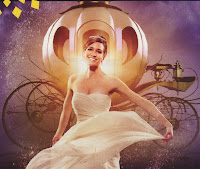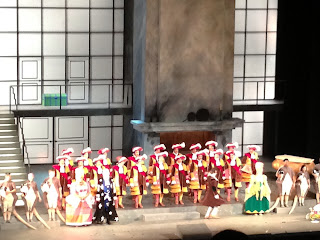Cinderella,
the opera, is composed by Rossini.
Rossini composed other operas that we’ve seen: Il Turko in Italia and
Barber of Seville, both we enjoyed tremendously.
Rossini’s
opera has a slightly different slant to the traditional fairy tale. First, there was a stepfather, not a
stepmother. There is also no fairy godmother. Instead, a beggar approaches Cinderella’s home. The beggar is given food by the good
Cinderella, but is driven off by her mean stepsisters. The beggar is actually the prince’s tutor
who tells the prince of a good-hearted woman who would be a good choice for his
wife. The prince was introduced to Cinderella when he was posing as a servant
while his manservant posed as the prince.
The prince wanted the opportunity to see the real side of a woman who
was to be his wife, not the pretenses because he is the prince. There was no shoe to find his missing
wife-to-be, but matching a bracelet.
 The
costumes were colorful and there were 6 cast members who played the mice. They were priceless as they not only
changed the scenery props in the background, but they provided comic
relief. In one scene, the prince
was supposed to be riding in his carriage and it breaks down near Cinderella’s
family home. To illustrate this,
the mice maneuvered a miniature carriage around the stage, stopped it and
kicked off one of the wheels. Then
to make it correct, they pushed the little carriage to one side so that it
slanted as if broken down. So
funny.
The
costumes were colorful and there were 6 cast members who played the mice. They were priceless as they not only
changed the scenery props in the background, but they provided comic
relief. In one scene, the prince
was supposed to be riding in his carriage and it breaks down near Cinderella’s
family home. To illustrate this,
the mice maneuvered a miniature carriage around the stage, stopped it and
kicked off one of the wheels. Then
to make it correct, they pushed the little carriage to one side so that it
slanted as if broken down. So
funny.  I
was disappointed that Cinderella was not transformed into a princess. All that happened is that her rag
dressed sort of poofed up on the sides and she wore a tiara. Big whoop. To the right is a picture on the program and also on Facebook. I didn't see anything close to this. The picture looked so magical, I was looking forward to the transformation.
I
was disappointed that Cinderella was not transformed into a princess. All that happened is that her rag
dressed sort of poofed up on the sides and she wore a tiara. Big whoop. To the right is a picture on the program and also on Facebook. I didn't see anything close to this. The picture looked so magical, I was looking forward to the transformation.
The
arias were sort of interesting though.
It is supposed to be a light-hearted opera and no one dies at the
end. The arias reminded me of
Mozart’s operas. In some arias,
they would be singing, then they would break out into a fast talking tune. It was enjoyable. Then a few days later, I was listening
to a workout song, “This City is My City”. The song has a tune, the in the midst, it breaks out into
rap. It reminded me of the songs
in the Cinderella opera. So
Rossini composed one of the earliest versions of rap. Funny.
Photo below is taken during the encore applause from our seats.





